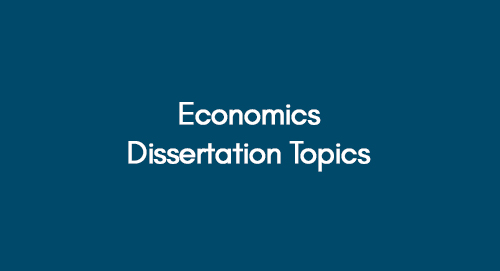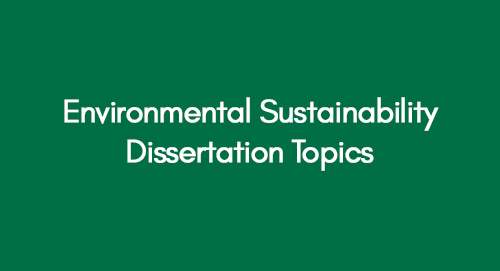
Economics Dissertation Topics | 50+ Ideas for Your Research
November 14, 2020
Fashion Dissertation Topics & Ideas 2025 | 155+ Free Topics
November 14, 2020Environmental sustainability refers to the responsible use and conservation of natural resources to meet the needs of the present without compromising the ability of future generations to meet their needs. It covers a wide range of topics, allowing students to explore issues related to the environment, conservation, and sustainable practices. Thus, students must choose the best environmental sustainability dissertation topics for their research.
Sustainability Dissertation Examples
Premier Dissertations has developed a list of 160+ exciting environment and sustainability research topics for researchers.
Environmental Law Dissertation Topics | Engineering Management Dissertation TopicsLatest Environment and Sustainability Dissertation Topics in 2025
- How do urban green spaces contribute to the mental well-being of residents?
- What urban planning strategies best promote accessible and sustainable green areas?
- Which renewable energy sources offer the most sustainable reductions in carbon emissions?
- How do policy frameworks influence renewable energy adoption in different regions?
- What are the primary challenges in implementing sustainable waste management systems in urban settings?
- How effective are community-led initiatives in reducing household waste?
- What climate-related factors are most detrimental to agricultural output in Sub-Saharan Africa?
- How can sustainable farming practices mitigate the impact of climate change on food production?
- How are fashion brands addressing environmental concerns in their operations?
- What role do consumers play in encouraging environmentally responsible fashion?
- What are the main challenges faced in water management in arid areas?
- How effective are emerging technologies like desalination and wastewater recycling in addressing water scarcity?
List of Environmental Sustainability Research Topics
Top Trending Research Topics in Environmental Sustainability
Most Researched Sustainability Dissertation Topics & Environment Dissertation Topics
Environmental Sustainability Research Topics for Undergraduate Students
Topic 45. Analysing the Role of Community-Based Recycling Initiatives in Reducing Urban Waste: A Case Study
Topic 46. Examining the Effectiveness of Green Building Certifications in Promoting Energy Efficiency: A Quantitative Study
Topic 47. Assessing the Impact of Climate Education on Sustainable Behaviour Among University Students: A Qualitative Study
Topic 48. Understanding the Role of Urban Green Spaces in Mitigating Heat Island Effects: A Systematic Study
Topic 49. Evaluating the Contribution of Renewable Energy Policies to Carbon Emission Reduction: A Case Study
Topic 50. Analysing the Influence of Plastic Ban Policies on Consumer Behaviour: A Quantitative Study
Topic 51. Examining the Relationship Between Sustainable Farming Practices and Biodiversity Conservation: A Qualitative Study
Topic 52. Assessing the Effectiveness of Eco-Labelling in Influencing Green Purchasing Decisions: A Systematic Study
Topic 53. Understanding the Role of Corporate Social Responsibility in Advancing Environmental Sustainability: A Case Study
Topic 54. Evaluating the Impact of Sustainable Tourism on Local Ecosystems: A Quantitative Study
Topic 55. Analysing the Role of Government Subsidies in Promoting Renewable Energy Adoption: A Qualitative Study
Topic 56. Examining the Effect of Eco-Friendly Packaging on Consumer Perceptions: A Systematic Study
Topic 57. Assessing the Role of Urban Agriculture in Enhancing Food Security: A Case Study
Topic 58. Understanding the Influence of Public Transport Improvements on Urban Air Quality: A Quantitative Study
Topic 59. Evaluating the Impact of International Agreements on Climate Change Mitigation Efforts: A Systematic Study
Topic 60. Analysing the Effectiveness of Plastic Waste Management Strategies in Coastal Cities: A Case Study
Topic 61. Examining the Role of Educational Campaigns in Reducing Water Wastage: A Qualitative Study
Topic 62. Assessing the Contribution of Circular Economy Practices to Sustainable Resource Utilisation: A Quantitative Study
Topic 63. Understanding the Role of Local Governments in Promoting Renewable Energy Projects: A Case Study
Topic 64. Evaluating the Effects of Deforestation on Regional Climate Patterns: A Systematic Study
Topic 65. Analysing the Impact of Ocean Clean-Up Projects on Marine Biodiversity Conservation: A Case Study
Topic 66. Examining the Effectiveness of Sustainable Urban Mobility Plans in Reducing Carbon Emissions: A Quantitative Study
Topic 67. Assessing the Role of Green Financing in Facilitating Renewable Energy Investments: A Qualitative Study
Topic 68. Understanding the Influence of Consumer Awareness on the Success of Sustainable Products: A Systematic Study
Topic 69. Evaluating the Effect of Electric Vehicles on Reducing Urban Pollution Levels: A Case Study
Topic 70. Analysing the Relationship Between Reforestation Projects and Community Livelihoods: A Qualitative Study
Topic 71. Examining the Impact of Sustainable Product Design on Waste Minimisation: A Quantitative Study
Topic 72. Assessing the Role of Green Roofs in Urban Temperature Regulation: A Systematic Study
Topic 73. Understanding the Role of International NGOs in Promoting Global Environmental Sustainability: A Case Study
Topic 74. Evaluating the Effects of Corporate Carbon Offsetting Strategies on Stakeholder Perception: A Qualitative Study
Topic 75. Analysing the Role of Zero-Waste Policies in Enhancing Sustainable Consumption Practices: A Systematic Study
Topic 76. Examining the Impact of Sustainable Fisheries Practices on Coastal Communities: A Quantitative Study
Topic 77. Assessing the Effectiveness of Energy-Efficient Housing Designs in Reducing Urban Carbon Footprints: A Case Study
Topic 78. Understanding the Influence of Renewable Energy Adoption on Rural Electrification: A Qualitative Study
Topic 79. Evaluating the Role of Digital Platforms in Promoting Environmental Awareness: A Systematic Study
Topic 80. Analysing the Relationship Between Urbanisation and Natural Habitat Degradation: A Case Study
Topic 81. Examining the Effectiveness of Community Participation in Conserving Protected Areas: A Quantitative Study
Topic 82. Assessing the Role of Eco-Tourism in Sustainable Economic Development: A Systematic Study
Environmental Sustainability Research Topics for Master Students
Topic 83. Analysing the Impact of Urban Rainwater Harvesting Systems on Water Security: A Case Study
Topic 84. Examining the Role of Artificial Intelligence in Monitoring Deforestation Trends: A Systematic Study
Topic 85. Assessing the Effectiveness of Green Supply Chain Practices in Manufacturing Industries: A Quantitative Study
Topic 86. Understanding the Relationship Between Sustainable Urban Design and Public Health: A Qualitative Study
Topic 87. Evaluating the Role of International Climate Finance in Supporting Renewable Energy Projects: A Case Study
Topic 88. Analysing the Adoption of Circular Economy Models in Reducing Industrial Waste: A Systematic Study
Topic 89. Examining the Role of Blockchain Technology in Enhancing Traceability in Sustainable Food Supply Chains: A Quantitative Study
Topic 90. Assessing the Contribution of Urban Forestry to Air Quality Improvement: A Case Study
Topic 91. Understanding the Influence of Climate Resilient Policies on Coastal City Planning: A Qualitative Study
Topic 92. Evaluating the Effectiveness of Carbon Capture Technologies in Heavy Industries: A Systematic Study
Topic 93. Analysing the Role of Sustainable Transport Systems in Reducing Greenhouse Gas Emissions: A Quantitative Study
Topic 94. Examining the Impact of Green Technology Innovations on Urban Energy Management: A Case Study
Topic 95. Assessing the Role of Public-Private Partnerships in Advancing Renewable Energy Projects: A Systematic Study
Topic 96. Understanding the Effectiveness of Environmental Laws in Mitigating Deforestation: A Qualitative Study
Topic 97. Evaluating the Impact of Smart Grid Systems on Renewable Energy Integration: A Case Study
Topic 98. Analysing the Role of Sustainable Finance in Accelerating Green Infrastructure Projects: A Quantitative Study
Topic 99. Examining the Effectiveness of Urban Composting Programs in Waste Management: A Systematic Study
Topic 100. Assessing the Contribution of Marine Protected Areas to Biodiversity Conservation: A Case Study
Topic 101. Understanding the Role of International Trade Agreements in Promoting Environmental Sustainability: A Qualitative Study
Topic 102. Evaluating the Impact of Urban Energy Efficiency Policies on Carbon Footprint Reduction: A Systematic Study
Topic 103. Analysing the Effectiveness of Nature-Based Solutions in Urban Flood Management: A Case Study
Topic 104. Examining the Role of Consumer Behaviour in Supporting Sustainable Product Development: A Quantitative Study
Topic 105. Assessing the Role of Solar Energy Microgrids in Enhancing Energy Access in Rural Areas: A Systematic Study
Topic 106. Understanding the Influence of Sustainable Urban Farming on Food Security in Urban Centres: A Qualitative Study
Topic 107. Evaluating the Contribution of Eco-Innovation to Competitive Advantage in Green Businesses: A Case Study
Topic 108. Analysing the Impact of Environmental Education on Youth Engagement in Sustainability Practices: A Systematic Study
Topic 109. Examining the Role of Data Analytics in Optimising Waste Collection Systems: A Quantitative Study
Topic 110. Assessing the Effectiveness of International Environmental Agreements on Climate Change Mitigation: A Case Study
Topic 111. Understanding the Influence of Renewable Energy Cooperatives on Community Energy Transition: A Qualitative Study
Topic 112. Evaluating the Role of Green Urban Planning in Enhancing Biodiversity Corridors: A Systematic Study
Topic 113. Analysing the Effectiveness of Carbon Neutral Strategies in Corporate Supply Chains: A Quantitative Study
Topic 114. Examining the Role of Citizen Science in Supporting Environmental Monitoring Efforts: A Case Study
Topic 115. Assessing the Impact of Climate Adaptation Strategies on Agricultural Resilience: A Systematic Study
Topic 116. Understanding the Role of International NGOs in Promoting Sustainable Development Goals: A Qualitative Study
Topic 117. Evaluating the Contribution of Renewable Energy Policies to National Energy Security: A Case Study
Topic 118. Analysing the Effectiveness of Climate Smart Agriculture in Combating Food Insecurity: A Quantitative Study
Topic 119. Examining the Role of Green Technology Start-Ups in Driving Sustainable Innovation: A Systematic Study
Topic 120. Assessing the Effectiveness of Policies Addressing Plastic Pollution in Coastal Communities: A Case Study
Environmental Sustainability Research Topics for Master Students
Topic 121. Analysing the Long-Term Impact of Renewable Energy Integration on National Grid Stability: A Systematic Study
Topic 122. Examining the Effectiveness of Marine Carbon Sequestration Techniques in Combating Climate Change: A Quantitative Study
Topic 123. Assessing the Role of Environmental Governance in Reducing Global Biodiversity Loss: A Case Study
Topic 124. Understanding the Influence of Indigenous Knowledge Systems on Sustainable Land Management Practices: A Qualitative Study
Topic 125. Evaluating the Effectiveness of Global Carbon Market Mechanisms in Achieving Net-Zero Targets: A Systematic Study
Topic 126. Analysing the Impact of Climate Refugee Policies on Regional Stability: A Case Study
Topic 127. Examining the Role of Green Hydrogen in Decarbonising Heavy Industries: A Quantitative Study
Topic 128. Assessing the Effectiveness of Ecosystem-Based Adaptation Strategies in Coastal Zone Management: A Systematic Study
Topic 129. Understanding the Socioeconomic Impacts of Large-Scale Reforestation Projects: A Qualitative Study
Topic 130. Evaluating the Contribution of Sustainable Mining Practices to Reducing Environmental Degradation: A Case Study
Topic 131. Analysing the Role of Advanced Bioplastics in Addressing Global Plastic Pollution: A Quantitative Study
Topic 132. Examining the Impact of Climate Change Policies on Food Security in Vulnerable Regions: A Systematic Study
Topic 133. Assessing the Effectiveness of Global Renewable Energy Partnerships in Driving Decarbonisation: A Case Study
Topic 134. Understanding the Role of Policy Frameworks in Advancing Nature-Based Carbon Offsetting: A Qualitative Study
Topic 135. Evaluating the Long-Term Impacts of Sustainable Urban Planning on Climate Resilience: A Systematic Study
Topic 136. Analysing the Role of Corporate Environmental Responsibility in Mitigating Greenhouse Gas Emissions: A Quantitative Study
Topic 137. Examining the Contribution of Renewable Energy Microgrids to Rural Electrification: A Case Study
Topic 138. Assessing the Potential of Regenerative Agriculture in Enhancing Soil Health and Carbon Sequestration: A Systematic Study
Topic 139. Understanding the Role of Global Environmental Advocacy Movements in Influencing Policy Change: A Qualitative Study
Topic 140. Evaluating the Effectiveness of Cross-Border Water Management Agreements in Reducing Transboundary Conflicts: A Case Study
Topic 141. Analysing the Impact of Green Building Certifications on Urban Sustainability: A Quantitative Study
Topic 142. Examining the Role of Environmental Tax Policies in Promoting Sustainable Business Practices: A Systematic Study
Topic 143. Assessing the Effectiveness of International Environmental Treaties in Mitigating Ocean Acidification: A Case Study
Topic 144. Understanding the Influence of Urban Heat Island Mitigation Strategies on Public Health Outcomes: A Qualitative Study
Topic 145. Evaluating the Contribution of Community-Based Conservation Projects to Wildlife Preservation: A Systematic Study
Topic 146. Analysing the Role of Circular Economy Policies in Enhancing Resource Efficiency in Industrial Sectors: A Quantitative Study
Topic 147. Examining the Impact of Climate-Smart City Initiatives on Urban Sustainability: A Case Study
Topic 148. Assessing the Role of Carbon Pricing Mechanisms in Driving Emission Reductions: A Systematic Study
Topic 149. Understanding the Potential of Solar Desalination Technologies in Addressing Water Scarcity: A Qualitative Study
Topic 150. Evaluating the Impact of Policy Innovations on Achieving Global Renewable Energy Targets: A Case Study
Topic 151. Analysing the Effectiveness of Urban Greening Initiatives in Mitigating Climate Change: A Quantitative Study
Topic 152. Examining the Role of Environmental Justice Movements in Promoting Equitable Sustainability Policies: A Systematic Study
Topic 153. Assessing the Contribution of Eco-Tourism to Local Community Development: A Case Study
Topic 154. Understanding the Role of Technological Innovations in Achieving Zero Waste Goals: A Qualitative Study
Topic 155. Evaluating the Impact of Urban Resilience Strategies on Disaster Preparedness: A Systematic Study
Topic 156. Analysing the Role of Environmental Risk Assessment in Large-Scale Infrastructure Projects: A Quantitative Study
Topic 157. Examining the Potential of Green Hydrogen for Achieving Carbon Neutrality in Transportation: A Case Study
Topic 158. Assessing the Influence of Corporate Environmental Reporting on Investor Decisions: A Systematic Study
Topic 159. Understanding the Role of Localised Renewable Energy Solutions in Community Empowerment: A Qualitative Study
Topic 160. Evaluating the Effectiveness of Regional Climate Adaptation Plans in Reducing Vulnerability to Climate Change: A Case Study
What is Environmental Sustainability and Why is it Important?
Today, the world is facing the worst implications of climate change in the form of global warming, rising sea levels, droughts and desertification. Environmental sustainability involves responsible and ethical practices that seek to preserve and protect the Earth's natural resources and ecosystems for present and future generations within the framework of environmental law. Human-induced factors, such as the extensive consumption of fossil fuels, have flamed environmental change at a rapid pace. By promoting sustainable practices, we aim to maintain a balance between human activities and the health of the planet, ensuring that our actions do not compromise the well-being of ecosystems or the ability of future generations to meet their needs.
How to Write a Good Environmental Sustainability Dissertation Topic?
To create a strong environmental sustainability dissertation topic, explore diverse areas like environmental engineering, research on issues, and sustainability challenges. Focus on topics that contribute innovative solutions and advance understanding of sustainable practices, addressing key environmental challenges.
How to Write a Winning Dissertation Topic
Be sure to check our website frequently because our expert writers will add to the list of topics. They are free for students to read and get an idea for their dissertations.
GOOD LUCK!


























